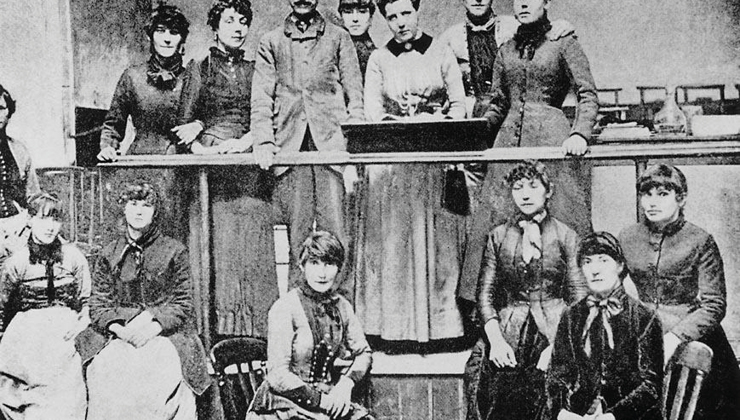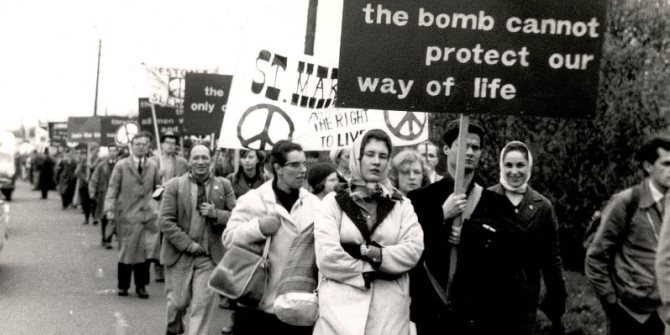Christine Chinkin reflects on the Women, Peace and Security Agenda today and the continued promises followed by failed implementation as we see the persistent set back of women’s human rights globally.
The annual Women, Peace and Security (WPS) Open Debate at the UN Security Council provides a yearly opportunity to assess the implementation of the WPS agenda across continents and contexts, and often leads to the adoption of a further WPS resolution. In 2019, two WPS resolutions were adopted: Resolution 2467 was long and detailed but criticised for its omission of any explicit provision on reproductive and sexual rights, although a more nuanced reading allows for their inclusion; while Resolution 2493 was little more than a ‘holding’ resolution looking forward to the 20th anniversary of Resolution 1325 in 2020.
The 2020 debate produced no such resolution, as 10 states abstained from the draft put forward by the Russian Federation. Explanations for the abstentions included that the draft resolution inadequately reflected the normative framework with respect to women’s human rights, did not address implementation in a meaningful way and would have eroded previous progress in the WPS agenda. So after this hiatus, where is WPS today? While rhetorically we see continued promises to the principles of WPS, the failure of its implementation is exposed through multiple global crises and the continued setting back of women’s human rights globally.
The 2021 Open Debate provided the opportunity to assess the further development of WPS in the two years since the last resolutions in 2019. The context was not easy, set as it was during the “biggest avalanche of crises in generations”. Two background occurrences were especially relevant. First, this was the second year of the COVID-19 pandemic, which had seen a spike in the incidence and global prevalence of gender-based violence. The pandemic “revealed the fragility of hard-won progress in this field and the risk of political commitments being rolled-back or reversed as attention and resources were redirected to the prevailing public health emergency.” State responses to the pandemic have meant that victims of conflict-related sexual violence face additional barriers in reporting violence and in accessing appropriate services, especially relating to sexual and reproductive healthcare; delivery of humanitarian aid has also been impeded and reduced. At the same time as the pandemic diverted attention from and exacerbated inequalities and social injustices, military expenditure increased, the arms race was relaunched and power grabbing was evident.
Second, the seizure of power by the Taliban in Afghanistan following the withdrawal of US and NATO members’ troops in August 2021 puts to the test all the pillars of WPS: women’s participation: prevention and protection against sexual and gender-based harms to women; the dire necessity of humanitarian relief and recovery; and, most poignantly, prevention of conflict. The open letter from the NGO Working Group on WPS to the Security Council in advance of the 2021 Open Debate placed Afghanistan and protection and support for women human rights defenders and peacebuilders at the centre of civil society demands of the Council.
It is not only in Afghanistan that the Council’s responsibility for the continued viability of WPS is under question. Among many other situations – such as those in Myanmar, Yemen, Mali – that in Tigray also demonstrates the blatant disregard of other thematic resolutions of the Security Council as well as of WPS. Resolution 2417 on armed conflict and hunger expressing the Council’s willingness to take the necessary measures when informed of the risk of famine and food insecurity has not been given effect. Nor does the Council’s press statement of 5 November 2021 refer to the reports of sexual violence in the armed conflict in northern Ethiopia. Continued situations of crisis and rampant militarised violence expose the deprioritisation of the core principles of the WPS agenda on conflict prevention and human security.
The 2021 WPS Open Debate was thus a pivotal moment for, at a minimum, renewed commitment to implementation of WPS on the ground and, more ambitiously, for innovative thinking to release the transformative potential of the WPS agenda, especially in what is hoped to be the ‘post-pandemic’ era.
Continued situations of crisis and rampant militarised violence expose the deprioritisation of the core principles of the WPS agenda on conflict prevention and human security.
In his opening speech to the Open Debate, the Secretary-General reminded the Council that “conflict prevention and disarmament have been precisely at the heart of the movements for peace led by women for more than a century” and that “there is a direct link between increased investment in weapons and increased insecurity and inequalities affecting women.” Indeed, women peace activists have campaigned for over a century, and continue to do so, for disarmament. Antonio Guterres is not the first Secretary-General ostensibly to prioritise disarmament, but as Louise Arimtsu has said, he is the first to emphasise the need for greater formal involvement of women in this field. Yet despite his emphasis on reversing the trajectory in military spending, the three demands the Secretary-General made of the Council were less confrontational:
- That the Council support work to strengthen and deepen partnerships with local women leaders and their networks;
- That it help protect women human rights defenders and activists.
- And that it work to promote women’s full, equal and meaningful participation in peace talks and peacebuilding.
These demands are inter-related and if they were taken on board by the Council with full political will and allocation of resources they have the potential to be transformative. Some representatives at the 2021 Open Debate picked up on the themes, in many instances bringing them together. The first requires meeting with women in their local contexts, listening to their concerns and priorities and spending time understanding where they are coming from and where they want to go. In the words of the President of the Council “We must therefore endeavour to see women; we must make their work, their experiences and accomplishments visible. We must invest in them; we must walk in their pathways and on their streets in order to incorporate their ambitions and needs into national and international policies and strategies and fully comprehend their interventions in the construction and maintenance of peace.”
To this end, WILPF urged in July that the Council make a country visit to Afghanistan to ensure implementation of the WPS resolutions and to give life to the peace process. This invitation was not heeded. Nor is it enough to invite a spokesperson from a local women’s group to the Council meeting and then – as happens too often – ignoring her message. Moreover, in light of restrictions introduced by the pandemic, civil society continues to be barred from participating in person at the UN, the only group to still be subject to these restrictions.
The second demand, responding to the grave dangers that women’s human rights defenders and peacebuilders face and recognising the significant price they pay for their leadership on human rights, climate activism and environmental protection, engaged a number of speakers. The importance of the Council working in partnership with these local civil society actors was stressed by many and further steps for their protection were also urged, including ensuring their security from reprisals after attending the Security Council.
Other speakers raised the need to ensure adequate resources for the development of collective and territorial self-protection measures, tackling impunity and holding perpetrators to account, and creating a safe environment where peacebuilders and human rights defenders could carry out their activities free from harassment and violence.
Many delegates concurred with the third demand – the need to enhance women’s participation in all stages of peace processes recognising that this “is not only a matter of justice and rights”, but directly benefits the sustainability of the process and its outcome. But although Afghanistan was explicitly mentioned in this regard, the rhetoric does not match the reality. On the day of the debate, Feminist Action for Afghanistan – a global coalition of feminist, women’s rights organisations, and Afghan women’s organisations – sent a letter to the Secretary-General and the permanent delegates to the UN expressing their outrage at the “parade of men-only delegations” on matters pertaining to Afghanistan. The letter rejects only an advisory role for Afghan women and demands their decision making authority in all aspects of future planning in negotiations, which should be characterised by “greater responsiveness, transparency, and accountability”. Excluding women, the letter continues, constitutes a complete denial of the WPS agenda, instead constituting “de-facto complicity with the Taliban’s agenda to eliminate women from public life and to reverse previous commitments to the human rights of Afghan women and girls.”
In the Secretary-General’s own words, the time had come for truth. The truth is that events in Afghanistan in the summer of 2021 and beyond have exposed the Council as unable or unwilling to act in accordance with its primary responsibility for the maintenance of international peace and security or to give effect to its WPS agenda. Despite its expressed commitment to “continued support for the people of Afghanistan”, it did not take the necessary steps for the security of those at threat from the Taliban – women, LGBTQI people and those who have worked to defend human rights and the rule of law – or to ensure delivery of humanitarian needs. Delegates at the Open Debate urged the Council to reaffirm unequivocally that it will not accept that the rights of women and girls can be trampled upon with impunity. This is one objective of WPS and full implementation of the WPS resolutions would be a step toward this, but more active steps and innovation are needed.
Resolution 1325 was conceived of by civil society as a women’s peace and justice project, but the resolutions fail to insist upon disarmament and the dismantling of the culture of militarism that are essential to achieving peace or justice. Although one speaker found it “shocking that, even at the height of a global pandemic, military spending in much of the world was greater than pandemic-related health spending”, the reality is that the call of the 2015 Global Study to say “No to militarization” has gone unheeded and militarism and violence are normalised. Civil society, through individuals and groups, have worked tirelessly and fearlessly to assist Afghans find security; the Council needs now to accept that it needs to work in partnership with civil society if it is to regain credibility and become an organisation committed to peace, not violence.
This blog is part of a project that has received funding from the European Research Council (ERC) under the European Union’s Horizon 2020 research and innovation programme (Grant agreement No. 786494).
The views, thoughts and opinions expressed in this blog post are those of the author(s) only, and do not necessarily reflect LSE’s or those of the LSE Centre for Women, Peace and Security.
Image: Afghan women leaders and human rights defenders speak to press ahead of the side event ‘New Chapter in Afghanistan: Ensuring Support of Afghan Women & Girls’ held in the Trusteeship Council at the United Nations Headquarters on Thursday, 21 Oct. 2021. Credit: UN Women (CC BY-NC-ND 2.0).





